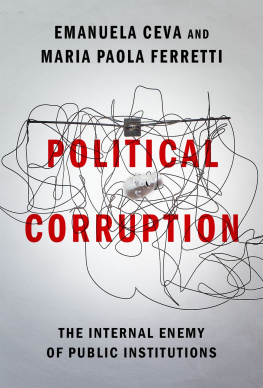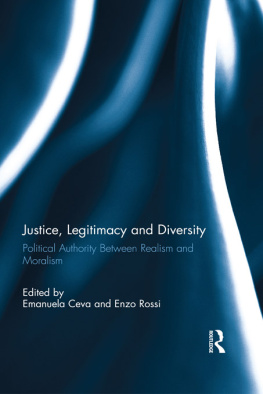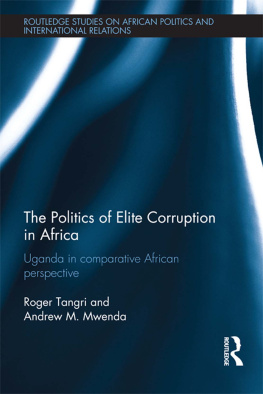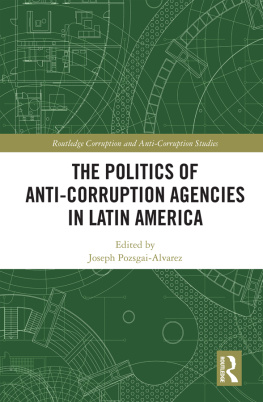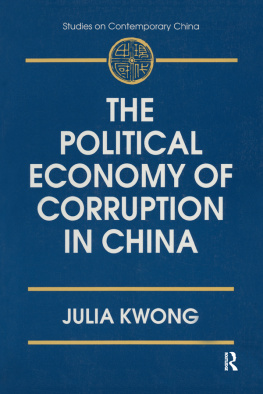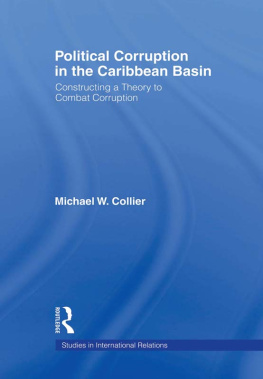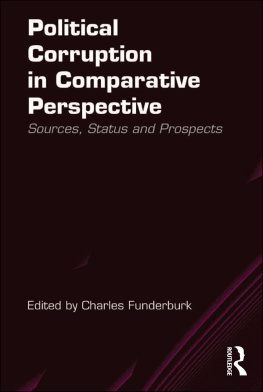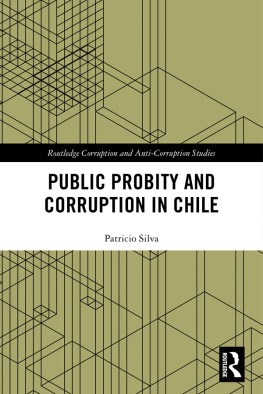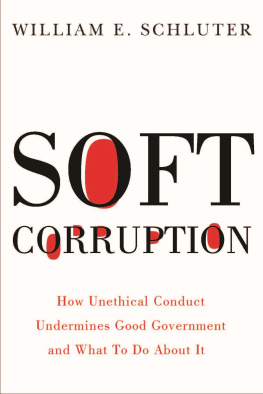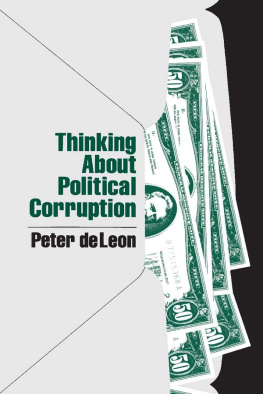Political Corruption

Oxford University Press is a department of the University of Oxford. It furthers the Universitys objective of excellence in research, scholarship, and education by publishing worldwide. Oxford is a registered trade mark of Oxford University Press in the UK and certain other countries.
Published in the United States of America by Oxford University Press
198 Madison Avenue, New York, NY 10016, United States of America.
Oxford University Press 2021
All rights reserved. No part of this publication may be reproduced, stored in a retrieval system, or transmitted, in any form or by any means, without the prior permission in writing of Oxford University Press, or as expressly permitted by law, by license, or under terms agreed with the appropriate reproduction rights organization. Inquiries concerning reproduction outside the scope of the above should be sent to the Rights Department, Oxford University Press, at the address above.
You must not circulate this work in any other form and you must impose this same condition on any acquirer.
Library of Congress Cataloging-in-Publication Data
Names: Ceva, Emanuela, author. | Ferretti, Maria Paola, author.
Title: Political corruption : the internal enemy of public institutions /
Emanuela Ceva and Maria Paola Ferretti.
Description: New York , NY : Oxford University Press, 2021. |
Includes bibliographical references and index.
Identifiers: LCCN 2020058619 (print) | LCCN 2020058620 (ebook) |
ISBN 9780197567869 (hardback) | ISBN 9780197567883 (epub)
Subjects: LCSH: Political corruption. | Political ethics. |
Public administrationMoral and ethical aspects.
Classification: LCC JF1081 .C38 2021 (print) | LCC JF1081 (ebook) |
DDC 172/.2dc23
LC record available at https://lccn.loc.gov/2020058619
LC ebook record available at https://lccn.loc.gov/2020058620
DOI: 10.1093/oso/9780197567869.001.0001
Contents
Many have asked what it is like to write a philosophy book with four hands. In our experience, it has been a great adventure; talking through rough thoughts, exchanging drafts all over Europe and beyond, struggling with revisions, trashing entire chapters, reformulating, and redrafting. Throughout the process, no single paragraph was completed until we were both satisfied with it. We made this roller-coaster run smoothly perhaps because we have traveled the same academic path, even if we walked it with a small time lag. We began studying philosophy at Pavia, where Salvatore Veca introduced a whole generation of Italian students to analytical political philosophy, and Ian Carter encouraged them to pursue their studies in the United Kingdom. We were first at York and then at Manchester, where Hillel Steiners acumen helped us survive the strenuous times of our PhD research. We are indebted to Salvatore, Ian, and Hillel in many ways, but perhaps the greatest debt we owe them is in showing us the importance of letting our own interests guide our research, rather than participating in the fashionable debates of the discipline.
So, we were not discouraged when we first presented our ideas on the inherent wrongness of political corruption and encountered some resistance. It is quite obvious, many told us, that political corruption is wrong: It has so many harmful consequences! Why, we were asked, would we bother investigating its nature any further? Over the past six years, we have managed to persuade some of those colleagues that the project was worthwhile. Indeed, we have found many philosophers and theorists willing to engage with us in discussions, as well as journals willing to publish the preliminary results of our research.
We have presented parts of this book in different venues. The present version has benefited greatly from the comments and discussions with the audiences of many events, including the ECPR General Conference, University of Hamburg (2018); the Royal Institute of Philosophy Public Lecture at the Department of Philosophy, University of Kent (2017); the Joint Sessions of the Aristotelian Society and Mind Association, University of Warwick (2015); and the Society for Applied Philosophy Conference, St. Annes College, Oxford (2014). The workshop on political corruption organized at the Edmond J. Safra Center for Ethics of Harvard University (2018) gave us valuable insights provided by exchanges with Eric Beerbohm, Candice Delmas, Jenny Mansbridge, Tim Scanlon, and Dennis Thompson. In spring 2017, David Schmidz organized the Liberty Fund Conference Freedom from Corruption at Hermosa Beach, California, where we refined our ideas during challenging conversations with Adrian Blau, John Hasnas, Mark Knights, Elijah Millgram, Michael Munger, and Daniel Weinstock. We are also very grateful for the opportunity many philosophy and politics departments offered us to discuss our work in their seminar series, in particular the Blavatnik School of Government, Oxford (2019); University of Pavia (2016 and 2019); Universit Paris I, Sorbonne (2018); University of Tel Aviv (2018); Kings College London (2018); University of Bayreuth (2018); TU Delft (2016); Sciences Po, Paris (2015); Universit de Montral (2015); University of Trento (2015); and TU Darmstadt (2015).
In December 2018, we held a book manuscript workshop at the University of Pavia, which proved incredibly valuable in improving our work. In particular, Gillian Brock, Elizabeth David-Barrett, Antony Duff, Nik Kirby, Mark Knights, and Robert Sparling offered most helpful responses to the various book chapters. We are grateful to them and to the other participants, in particular to Michele Bocchiola and Sandra Marshall, for reading and commenting on the entire manuscript. We also owe a great debt of gratitude to the following scholars and friends, who have provided insightful comments on the manuscript at different stages of the writing process: Chiara Cordelli, Lisa Herzog, Mark Knights, Larry Lessig, Dennis Thompson, and Petr Urban. Many friends and colleagues generously provided various forms of assistance and encouragement in developing the ideas presented in this book. It is impossible to name all of them, but we particularly wish to mention Carla Bagnoli, Riccardo Ceva, Francesco Chiesa, Harry David, Rainer Forst, Andrea Fracasso, Anna Elisabetta Galeotti, Sigall Horovitz, Ina Kubbe, Miranda Loli, David Miller, Darrel Moellendorf, Dorota Mokrosinska, Nicoletta Parisi, Andrei Poama, Lubomira Radoilska, Daniele Santoro, Veith Selk, Kevin Valier, Alice Pinheiro Walla, Greg Whitfield, Jo Wolff, Lea Ypi, Bernardo Zacka, and Federico Zuolo.
For institutional support, Emanuela is indebted to the Edmond J. Safra Center for Ethics, Harvard University; Centre de Recherche en tique, Universit de Montral; Blavatnik School of Government, University of Oxford; and her new academic home, the School of Social Sciences of the University of Geneva. Our participation in many conferences and the organization of seminars and workshops would not have been possible without the generous financial support of the Fulbright Commission (which awarded a research scholarship in philosophy to Emanuela in 2018) and the Cariplo Foundation and Regione Lombardia, which sponsored the project La corruzione delle relazioni (20182019). Maria Paola acknowledges her support received at TU Darmstadt and at the Research Centre Normative Orders at the Goethe University of Frankfurt am Main, and the Strategic partnership framework between Tel Aviv University and Goethe University of Frankfurt (2018), which made possible numerous profitable exchanges with colleagues in Tel Aviv. During our teaching seminars at the University of Pavia, the University of Genve, TU Darmstadt, and Goethe University of Frankfurt am Main, our students have been wonderful interlocutors and have helped us clarify many arguments we present in this book, making them more accessible to our audience.

